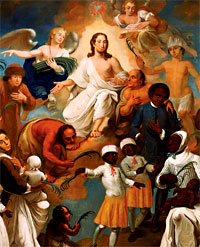| |
|
|
| |
SETH MOGLEN |
|
| |

The problem of excess is, at once, psychological and material. It is a matter
both of feeling and politics.
Since it is, in part, psychological, let me begin with one of Sigmund Freud's
psychoanalytic parables—in this case, a parable about excrement. Freud
tells us that before toilet training, little children experience defecation as a
pleasurable act of creation. So imagine, if you will, a young child, enraptured
with the productions of her own body, who leaves in some public part of the
home, as a gift to her parents, a turd. Her parents may respond in various
ways. In the culture of Freud's bourgeois fin-de-siècle Vienna, revulsion was
perhaps the most likely: a sense of distress that something expelled from
the body—waste, excess—had been deposited where it did not belong.
The child is then taught that waste must not merely be expelled from the
body, but purged from the home, family, and civilized community. It must
be expunged, buried, washed away, disposed of without a trace, separated
from the senses and from feelings of pleasure or desire. The boundaries of
the ego, the domestic sphere, and the social order are constructed in this
way.
Read |
|
| |
|
|
|
| |
|
|
| |
JOAN WALLACH SCOTT |
|
| |
Emancipation is a tricky word. According to the Oxford English Dictionary, it
denotes the lifting of "restraints imposed by superior physical force or legal
obligation." In Roman law emancipation referred to the freeing of women
or children from the patria potestas-the father's power. In English civil law,
Catholics were enfranchised by the Catholic Emancipation Act of 1829.
Slaves in the United States were manumitted in 1863, with the terms set
forth in Abraham Lincoln's famous "Emancipation Proclamation." (Although
emancipation and manumission are now used synonymously, in ancient
Rome, manumission referred specifically to slaves or servants, emancipation
to family members.) Figuratively, the word has been extended to mean
liberation from "intellectual, moral, or spiritual fetters." Here the issue is
not so much action by an external agency, as it is an internal matter, a change
in consciousness. For the Young Hegelian Bruno Bauer writing in the early
nineteenth century, for example, Jewish emancipation (citizenship) could
come only when Jews renounced (freed themselves from) Judaism as a public
identity. Religion was antithetical to the putative universalism of the
secular state, and for that reason, he added, the state must also renounce
Christianity.
Read |
|
| |
|
|
| |
|
|
| |
AFSANEH NAJMABADI |
|
| |
Over the past decade, issues of gender and sexual rights (at times ensconced
within human rights) in Muslim-majority countries have acquired urgent
political circulation. Concurrently, many have articulated critical positions
regarding the deployment of this discourse of rights-for-imperialist-ends. I
do not propose to add to this critique here.
Read |
|
| |
|
|
|
| |
|
|
| |
CAROLINE ARNI |
|
| |
In 1833, a time abounding with combative pamphlets, a particularly explicit
declaration made its appearance: "This first writing by a woman is but a
gauntlet thrown into the arena, yet in the author's quiver remains more than
one arrow for defending the truth of her first writing." So reads the epigraph
of a short brochure, published by its author and entitled Appel d'une femme au
peuple sur l'affranchisement de la femme (Appeal of a woman of the people for
the emancipation of woman). From what we know about the writer of this
text and what remains of her work, she appears to be among those solitary
figures whom Joan Wallach Scott has described as 'neither typical . . . nor
unique."
Read |
|
| |
|
|
| |
|
|
| |
SARA R. FARRIS |
|
| |
This depiction of the relation between the First World and the Global South
in terms of the sexual division of labor within the household should not
be understood as merely a metaphor for the power relations and uneven
development engendered by neoliberal globalization. Rather, it should be
taken quite literally: poor countries increasingly provide the nannies and
maids who work in rich countries.
Read |
|
| |
|
|
| |
|
|
| |
CAROLE S. VANCE |
|
| |
The increasing prominence of trafficking into forced prostitution as a global
social problem has resulted in a flood of popular and official representations
in journalism, documentary, fictionalized accounts, and findings-of-fact. All
attempt to tell the story of sex trafficking, often shortened to "trafficking," as
predominantly involving women from the Global South.
Read |
|
| |
|
|
|

